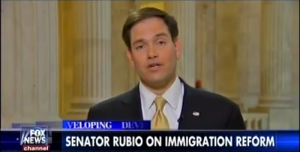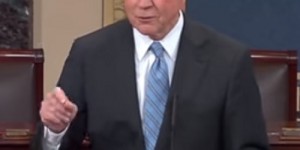Pro-illegal alien zealot Sen. Charles Schumer admitted this week that Sen. Marco Rubio’s “fingerprints” were all over 2013 amnesty legislation.
“He was not only totally committed— he was in that room with us, with four Democrats, four Republicans… for hours a day, week after week after week,” Schumer told CNN. “His fingerprints are all over that bill. It has a lot of Rubio imprints.”
“He understood it, he molded it, he made it a tough path to citizenship,” Schumer said. “But we all agreed to it, and it would have to be a tough path to citizenship. But he was all for it.”
Rubio has been looking for a new position on immigration for his Presidential campaign.
As many reports have indicated, in 2013 Rubio became the public face of the immigration agenda of Barack Obama, La Raza, and the Chamber of Commerce. Rubio was the “salesman” for the bill— it was Rubio’s job to sell the bill to conservative opinion makers, who had trusted him.
For instance, at the time Rubio pledged to Rush Limbaugh, “If there is not language in this bill that guarantees that nothing else will happen unless these enforcement mechanisms are in place, I won’t support it.” Even though, as Sen. Schumer explained, the bill would grant amnesty to the illegal population “on day one” before the border was secured, Rubio voted for the bill anyway.
As Senator Sen. Jeff Sessions (R-AL) said, Rubio has never changed his immigration positions on anything— nor has he ever asked for an apology or admitted that anything he ever said was wrong. Rubio has continued to pledge his support for all of the major policies outlined in the Gang of Eight bill: including green cards and thus citizenship and welfare for illegal aliens, expanded refugee resettlement, and he has introduced brand new legislation backed by his Silicon Valley supporters to massively increase the number of wage-cutting H-1bs. Rubio has also admitted that he would continue the President’s unconstitutional DACA amnesty.
In a recent article regarding Rubio’s refusal to commit to revoking Obama’s unconstitutional executive amnesty, Greg Sargent of the Washington Post writes, “Rubio had hoped to fudge the issue, signaling sufficient contrition to conservatives while still keeping his positions vague enough to leave a route back to supporting some form of reform that includes legalization in the general election.”




























